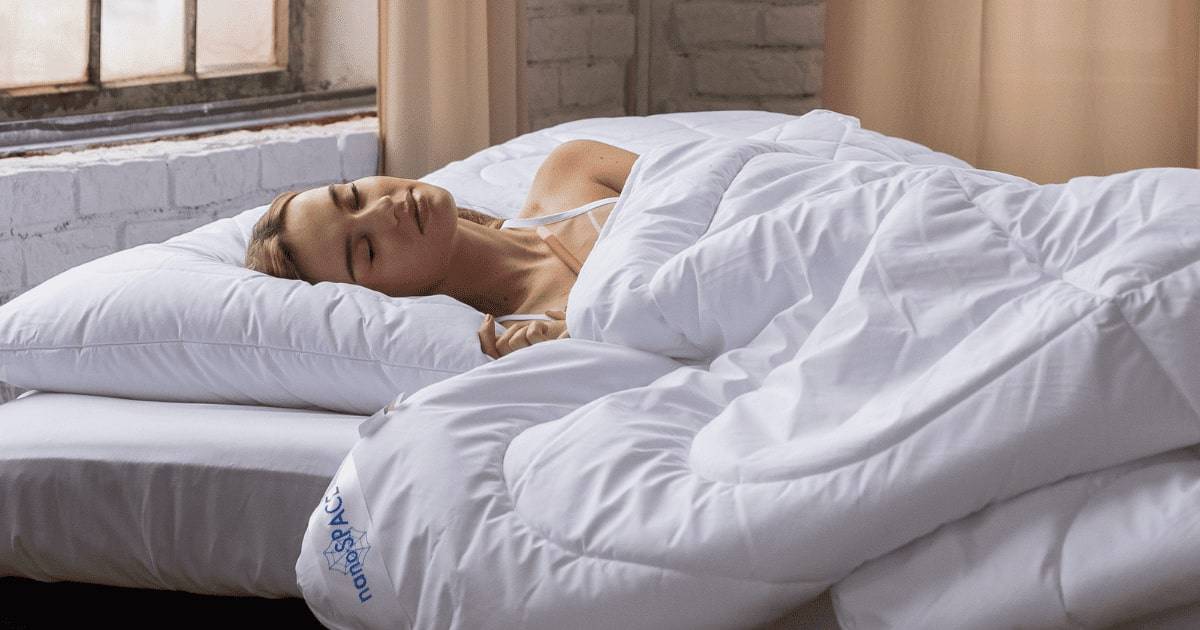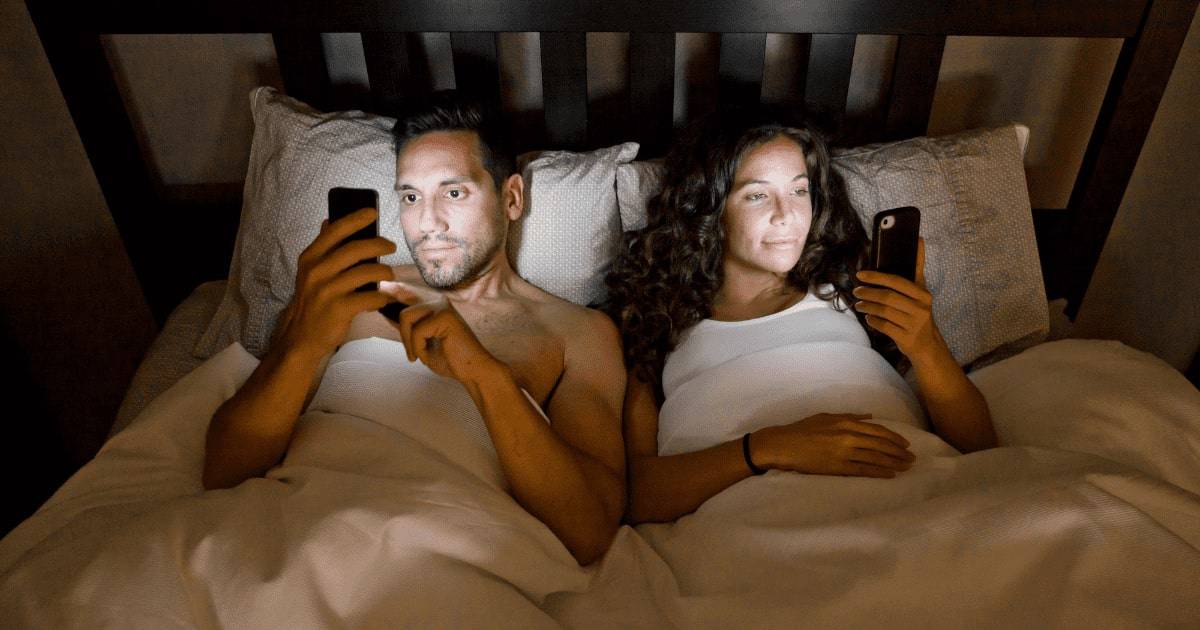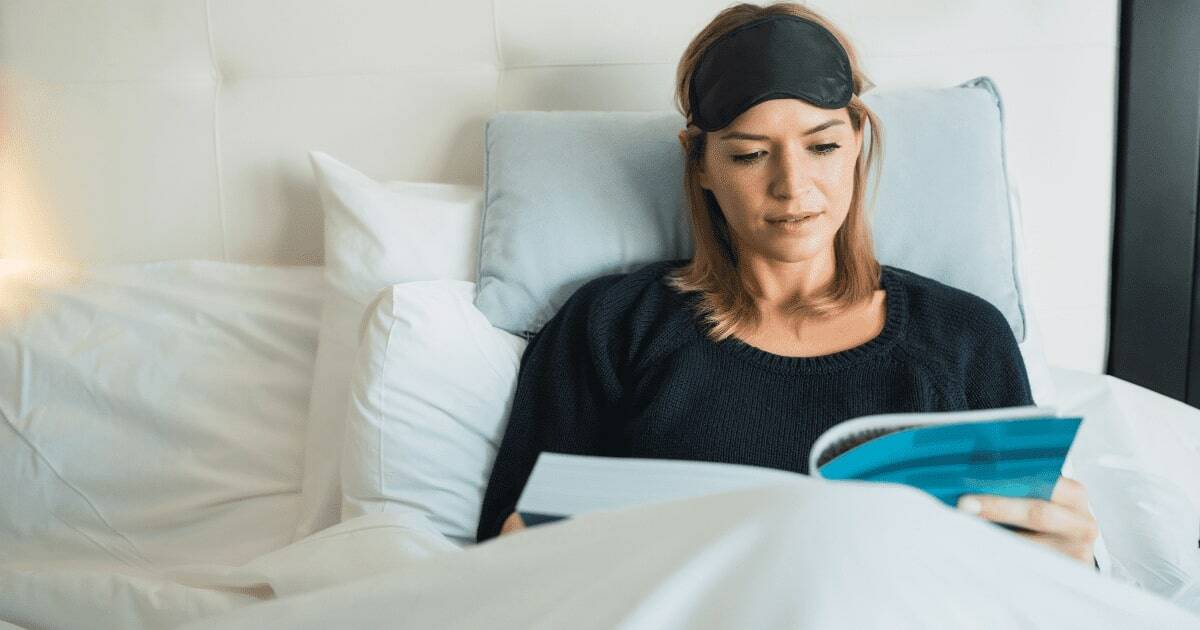Can't fall asleep? Don't worry, we'll tell you how to fall asleep reliably within minutes. We'll look at how to improve the overall quality of your sleep, give you tips on what to change in your bedroom to sleep better, and recommend herbs and dietary supplements that help you fall asleep faster. You'll learn what the right temperature should be in your bedroom and learn some breathing exercises that help you fall asleep faster.
.jpg)
Why It Is Important to Sleep 8 Hours a Day
Sleep is the most important thing you can do for yourself every day. It has been proven that the less you sleep, the shorter your life is. Quality sleep is essential to maintain good health and longevity. It is currently the best measure of nature against death. A well-slept night benefits our brain, body, and skin.
Lack of Sleep - Symptoms
The main symptoms of sleep deprivation include excessive daytime sleepiness, decreased concentration during the day, and slower thinking and mood changes.
The feeling of extreme fatigue during the day is one of the characteristic signs of lack of sleep. In some cases, it leads to microsleep, when a person falls asleep for a few seconds, which is very dangerous, especially when driving.
Insufficient sleep can directly affect how a person feels during the day. Examples of these symptoms include:
- Slowed thinking.
- Reduced attention.
- Worsened memory.
- Low performance.
- Microsleep while driving.
- Bad or risky decision making.
- Lack of energy.
Mood changes include feelings of stress, anxiety, or irritability.
Why Can't You Sleep at Night?
Have you ever thought to yourself, "Why can't I fall asleep?" The most common reason is stress, both mental and physical. You know how it is, when you have a really stressful day and you lie in bed thinking about work or problems, it's hard to fall asleep.
Physical activity can also be a problem, if you exercise late in the evening, your body uses up a lot of magnesium and doesn't have time to relax. So if you have trouble sleeping, you should never exercise in the late evening.
In recent years, there has also been talk about artificial lighting that can deceive our brains and cause them not to produce melatonin. Therefore, in the evening you should only use small lamps and at least two hours before bedtime do not watch television, computers, but also phones or tablets. It is also suitable to light candles or smart bulbs.
If you love coffee, you should know that caffeine stays in our body for up to 7 hours. That's why it's best to have your last coffee 7 hours before bedtime.
Another big reason can be allergies that cause problems with breathing or itching of the body. Some drugs can also cause insomnia as a side effect.
The Most Common Reasons Why You Can't Sleep
- Stress.
- Physical activity after 4 pm.
- LED lighting and television in the evening hours.
- Artificial lighting.
- Caffeine in the afternoon.
- Lack of magnesium.
- Dust and mite allergies or pollen season.
- Drugs that have insomnia as a side effect.
30 Tips for Quickly Falling Asleep
We all know it, you need to get up in the morning but you can't fall asleep for anything in the world. Here are 30 tips that studies have found to be effective.
Short-Term Tips when You Can't Sleep
1) Don't give up after a few minutes
Don't give up after a few minutes, it is normal to lie in bed for 15 to 20 minutes before you actually fall asleep. Try to fall asleep again if you wake up in the middle of the night. Just like when falling asleep, don't give up too soon. If you can't fall asleep after 30 minutes, get out of bed, stretch and do something easy or tiring. Try folding laundry, tidying something up or reading magazines or a book for a while. Avoid screens and electronic devices.
Try breathing techniques for falling asleep
If you have sleep problems, try one of these breathing techniques:
2) 4-7-8 Breathing
The 4-7-8 breathing technique is one of the most popular, but how do you do it?
- Sit with your back straight.
- Put the tip of your tongue on the upper palate. Hold your tongue there for the entire exercise.
- Exhale through your mouth.
- Close your mouth and inhale through your nose while counting to 4.
- Hold your breath and count to 7.
- Exhale through your mouth and count to 8.
- Repeat these steps three more times.
It is important to maintain the alternating length of breaths in the ratio of breath lengths 4:7:8. Maintain this ratio throughout the exercise.
3) Diaphragmatic breathing – belly breathing
This is one of the most basic pranayama techniques and is often called "yoga breathing." Are you really breathing into your belly? No way. Of course, you can breathe only into your lungs.
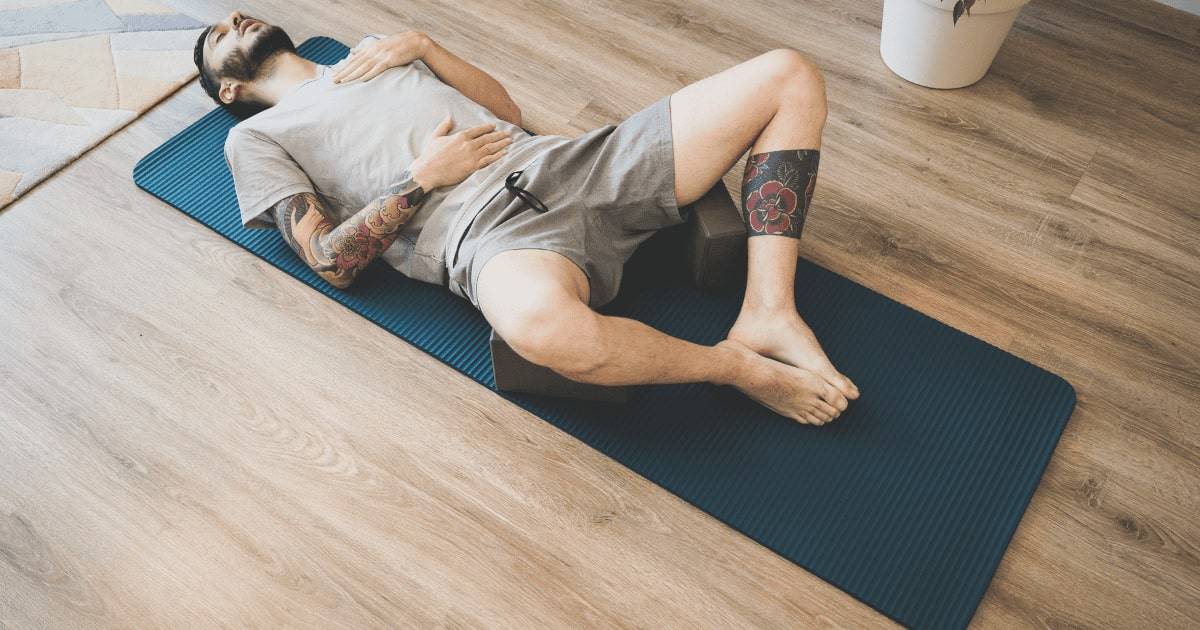
Lie comfortably on your back in bed and watch your breath for one or two minutes – pay attention to it. Find out if you can feel which parts of your body your breath touches and how. Look at how your abdomen is raised, direct your attention to your abdomen.
Put your hands on your abdomen. Inhale as if you want to push your palms up with your abdomen. At the same time, let the inhaled air also go to the sides of your abdomen. The navel should not move upwards towards the chest. Even when exhaling, try to maintain the intra-abdominal pressure.
4) Buteyko Breathing Technique
This method uses breathing control and breath holding exercises. The method is named after its founder, Soviet doctor Konstantin Pavlovich Buteyko (1923-2003) *. The benefit of the Buteyko breathing method is also strengthened control of breathing, and through proper breathing, a lot of situations and states can be overcome, from asthma to anxiety to insomnia.
How to do it?
- Sit up straight on the floor or on a chair.
- Breathe normally for a few minutes.
- After a relaxed exhale, hold your breath.
- Use your index finger and thumb to plug your nose.
- Hold your breath until you feel the urge to breathe, which may include involuntary movement of your diaphragm, and then inhale.
- Breathe normally for at least 10 seconds.
- Repeat several times.
5) Box Breathing (Box Breathing)
Surprisingly, this technique has nothing to do with breathing in a box. Box breathing is also known as square breathing. It is a thousand-year-old yoga technique that was revived and made famous by special SEAL units. The advantage is that this exercise can be done anywhere. How to do it?
- Inhale for 4 seconds.
- Hold your breath for 4 seconds.
- Exhale for 4 seconds.
- Wait 4 seconds and repeat.
6) Alternate nostril breathing
If you practice yoga, this breathing will not be foreign to you, it is again a yoga technique.
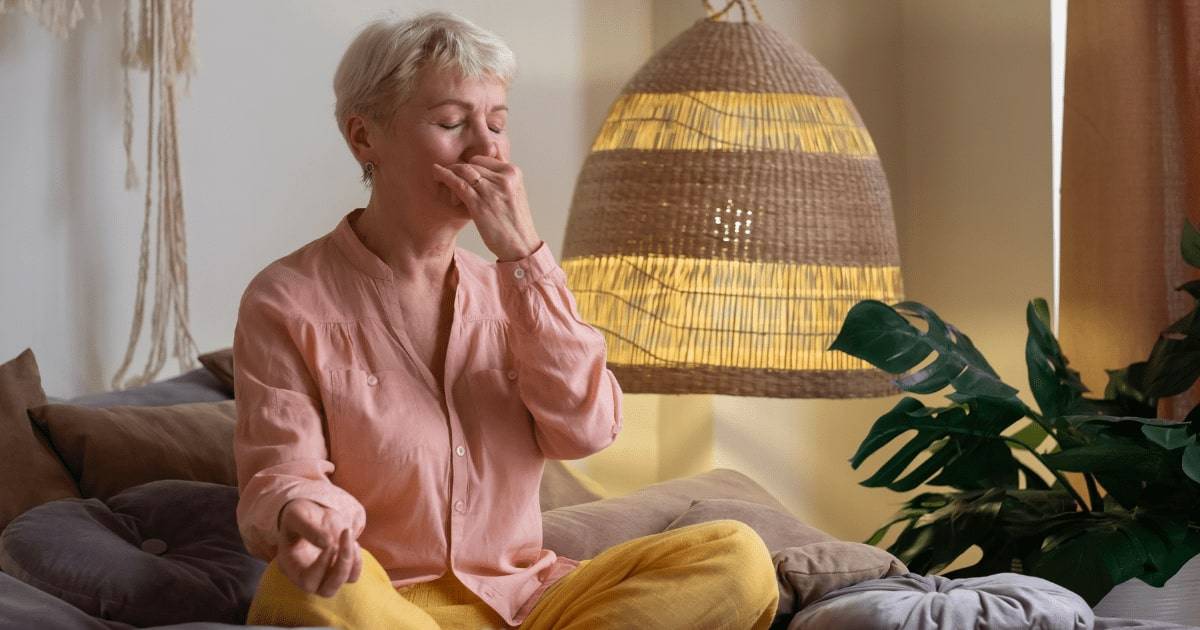
How to do it?
- Sit comfortably with straight back.
- Relax your left hand in your lap.
- Raise your right hand in front of your face.
- Allow your index finger and middle finger to rest between your eyebrows. You will actively use your thumb and ring finger.
- Close your eyes. Take a deep breath in and breathe out through your nose.
- Use your right thumb to close your right nostril.
- Slowly inhale through your left nostril.
- Close your left nostril with your ring finger. Both nostrils are now held closed. Hold your breath briefly.
- Open your right nostril. Exhale slowly through your right nostril. Pause at the end of the exhale.
- Slowly inhale through your right nostril.
- Hold both nostrils closed.
- Open your left nostril. Exhale slowly. Pause briefly at the end of the exhale.
- Repeat 5 to 10 times.
Tip: Try various breathing exercises to find the one that best helps you relax your body and mind, and then fall asleep.
7) Remove all lights and sounds
Turn off all lights and sounds if you haven't done so before sleeping. Some people are easily distracted by noise from outside, but some people find silence unsettling. Try white noise or devices that create rhythmic sounds (some people like the sound of a humidifier) to help you fall asleep. It has been shown that gentle ambient sounds improve sleep quality and help people fall asleep up to 38% faster.
8) Adjust the temperature in the room
Lower temperatures between 16 and 20°C are suitable for a peaceful and high-quality sleep. Generally, your bedroom should be about 3 to 4 degrees cooler than your living room. If you are cold, it is better to take a warmer blanket than to turn up the heat.
#produkty#https://www.nanospace.store/anti-dust-mite-duvets/
9) Support the production of melatonin
Melatonin is a naturally occurring hormone that can induce drowsiness. The good news is that melatonin supplements are available over the counter, but beware, the best ones are those that dissolve directly in the mouth.
In the Czech Republic, a mouth-soluble powder has been developed in collaboration with the First Medical Faculty of Charles University with a 600% higher effectiveness and an increased solubility of melatonin by 100%.
How does melatonin work?
Melatonin is produced in the epiphysis of your brain, which converts serotonin into melatonin based on your internal body clock. When the level of melatonin in your body increases, your blood pressure and body temperature may decrease, which can help you tune into sleep.
How long it takes for melatonin to start working can be affected by various factors such as your age, caffeine intake, exposure to light, weight, and tobacco use.
Melatonin supplements will not work if a deficiency of melatonin is not the reason why you are not sleeping. It can also be a problem if you use melatonin that is swallowed because its effects can negate stomach juices.
10) Supplement with magnesium
Magnesium is needed for the body to start producing hormones that are needed for deep sleep. At the same time, magnesium is responsible for the drowsy state before you go to sleep.
It helps you relax and regenerate your muscles. In addition, taking magnesium supplements has been shown to increase melatonin levels.
Another study showed that taking magnesium leads to lower levels of stress (both mental and physical), which can cause insomnia. The ideal form of magnesium is powder rather than tablets.
#produkty#https://www.nanospace.store/sleep-and-stress/
Magnesium in the form of tablets requires gastric acid to mineralize, so tablet forms of magnesium are less absorbed and have lower effectiveness. So what magnesium to choose? Try Magnesium Complex, which contains magnesium as well as substances that improve its absorption into the body.
11) Take an ice shower
Warning, this tip only works for someone. But if you don't know what else to try, it's definitely something that can help you.
When you sleep, your body temperature drops. When you take a cold shower before bed, you tell your body that it's time to sleep by starting the process of lowering your temperature.
Cold water helps put the entire system into sleep mode. For some, a hot bath works better. This is a tip that you will have to try.
12) Scan your body
A great way to relax your body is to do a body scan. Although body scanning may sound like a scary test in the hospital, in reality, it is a super technique that you can completely relax with. This type of relaxation technique has been proven to improve sleep quality.
How to do it? Lie down on your back and slowly go from the tips of your fingers to your entire body and feel how heavy it is. The whole body scan takes 10-20 minutes and you should feel relaxed after it.
13) Try meditation

Meditation reduces stress and can help you fall asleep. If you are already stressed out about not being able to sleep, try guided meditation. Sleep meditation usually includes soothing sounds or music that can contribute to a relaxing environment.
14) Write down everything that's on your mind
If you have thoughts that you can't control, get out of bed and try to write them down on paper. Whether it's tasks for the next day or just troubles. Writing a diary is a great activity if you are tired but can't sleep.
Studies have shown that writing a list of tasks before bed can help you fall asleep much faster. This is because you write all the tasks on paper and stop worrying that you might forget them the next day.
15) Hide clocks and alarms
If you constantly look at the clock as it ticks and you still don't sleep, take them and take them to another room. You are unnecessarily stressed by them and they can be the reason why you can't sleep.
16) Take the phone and electronics away from the bedroom
Electronics don't belong in the bedroom. If you use your phone as an alarm clock, put it far away from the bed so you can't reach it.
Modern technology often disrupts our sleep with constant notifications. Set your phone to night mode and avoid checking it in the evening.
17) Try a sleep-inducing tea
Herbal tea, such as chamomile or valerian, can be effective for relaxation. However, if you drink it too close to bedtime or when you've already been trying to sleep for a while, it may have the opposite effect and cause you to need to use the bathroom throughout the night.
18) Relaxation and stress-reducing supplements
If you're worried about the potential bathroom visits from a calming tea, it may be better to take relaxation supplements instead. For example, the Czech company mcePharma produces unique tablets that dissolve in the mouth with extracts of chamomile, magnolia, L-theanine from tea, and B vitamins that promote faster absorption.
19) CBD for sleep
CBD drops can also be effective for relaxation. CBD is commonly used for insomnia and a few drops of CBD, depending on the concentration, can be placed under the tongue. Higher concentrations are recommended because lower concentrations may have the opposite effect and energize you. Some studies suggest that CBD also promotes deeper sleep.
20) Change your position or location
If you're having trouble sleeping, you may want to try a different sleep position. While over 55% of people sleep on their sides and 38% sleep on their backs, only 7% of the population are stomach sleepers. While there's no universal sleeping position, you can prepare for success by making sure you have the right type of pillow for your sleeping position.
It's possible that ticking clocks, snoring partners, or even room temperature are bothering you. If you have another room in your home where you can sleep, try moving there. Sometimes a change of location can be just what your mind needs.
21) Scent for sleep
Do you respond to scents? Try a lavender room spray or brew some lavender tea. Lavender not only smells nice, but it also has calming effects.
Long-Term Tips for Quality Sleep
22) Learn to practice sleep hygiene
Make sleep a long-term priority and devote yourself to daily sleep hygiene. The foundation of sleep hygiene is going to bed and waking up at the same time every day (including weekends), avoiding blue light before bed, exercising and eating at appropriate times, and learning to relax without electronic devices before sleep.
#produkty#https://www.nanospace.store/nanobeauty/
Tip: Relax your skin before sleep with a nano-fiber dry face mask.
23) Go to bed at the same time
Teach your body when it should be tired. You can only do this by going to bed and waking up at the same time every day (including weekends). We all have our own internal clocks, and you may have noticed that when you need to get up at 6am, you often wake up before your alarm goes off. By going to bed and waking up at the same time, your body will learn this routine and you will fall asleep faster. However, this will not work if you do not sleep for the recommended 7-9 hours.
24) Create a pre-sleep routine
What helps with a good and quality sleep? A relaxing routine that you start 30 to 60 minutes before bedtime. Make it an evening ritual and stick to it every day. Everyone is different, but you should definitely not watch TV or use other electronics. They will definitely not calm you down.
25) Adjust your bedroom for better sleep
Your bedroom should be dark, quiet, and peaceful. You should also adjust the temperature of your bedroom to the ideal range of 15°C-19°C. If you get cold easily, invest in a warm blanket instead. Overheated rooms are not suitable for sleep or health. Plus, you'll save on heating. Make sure you're comfortable.
The foundation is a good mattress, pillows (choose ones where you can adjust and refill the filling), and the right warmth of the blanket (if you're cold in the winter and hot in the summer, buy two or invest in a DUO blanket).
Almost every fifth person is allergic to dust mites, if you wake up tired even after a good night's sleep, you probably belong to them. Invest in quality anti-mite bedding. Atopic individuals should sleep in organic cotton bedding that is not bleached or dyed. If you have atopic eczema, choose a suitable pyjama and nightgowns.
Almost every fifth person is allergic to dust mites, if you wake up tired even after a good night's sleep, you probably belong to them. Invest in quality anti-mite bedding. Atopic individuals should sleep in organic cotton bedding that is not bleached or dyed. If you have atopic eczema, choose a suitable pyjama and nightgowns.
#produkty#https://www.nanospace.store/favourable-sets/
26) Don't study until late at night
Do you want to learn faster for a test? Go to sleep. Students often deprive themselves of sleep to cram for exams. However, this is one of the biggest mistakes they can make. On the contrary, if we are sleep deprived, we make more mistakes and are less productive at school and at work.
Despite this, a number of students admit to studying until the early morning hours and sometimes not sleeping before an exam. Stop studying two hours before bedtime and engage in some relaxing activity. Read a book, listen to music, or create an evening routine for skincare.
Tip: We recommend trying a regenerative or calming nano-fiber face mask for relaxation.
27) Proper humidity for sleep
Too high or too low humidity can not only ruin your sleep, but also cause health problems. The recommended humidity in the bedroom during winter is 45-60% and in the summer 40-55%.
If the humidity in the room is too low, your skin may itch, but your respiratory tract will also suffer and health problems can arise, such as upper and lower respiratory tract infections, eye irritation, and migraines. It is proven that too low humidity has a major impact on sleep.
The humidity in the air is not good, either too high or too low. High humidity can increase alertness and reduce the amount of time you spend in NREM and REM sleep. As both of these phases are essential for your overall health, long-term high humidity in the bedroom can lead to additional problems related to bodily regeneration and long-term memory.
Do you not know the humidity in your home? Get a hygrometer. If you know you have low humidity in the air, try to use a humidifier at home. If you live in a house that is too humid, buy a high-quality dehumidifier.
Tip: Some humidifiers can be used as aroma lamps and you can buy scents that support sleep, such as lavender.
28) Regular exercise can both hinder and support sleep
It has been proven that at least 30 minutes of aerobic exercise can significantly improve sleep quality but decrease the time needed to fall asleep. However, it is extremely important not to exercise close to bedtime. If you have trouble falling asleep, exercise no later than 4 hours before bedtime.
29) Take in the morning sunshine
If the sun is shining in the morning, go out to the balcony or terrace and sit for at least 10 minutes. By letting your body see daylight in the morning, it slows down the production of melatonin (the sleep-inducing hormone), you will wake up faster and start your daily rhythm.
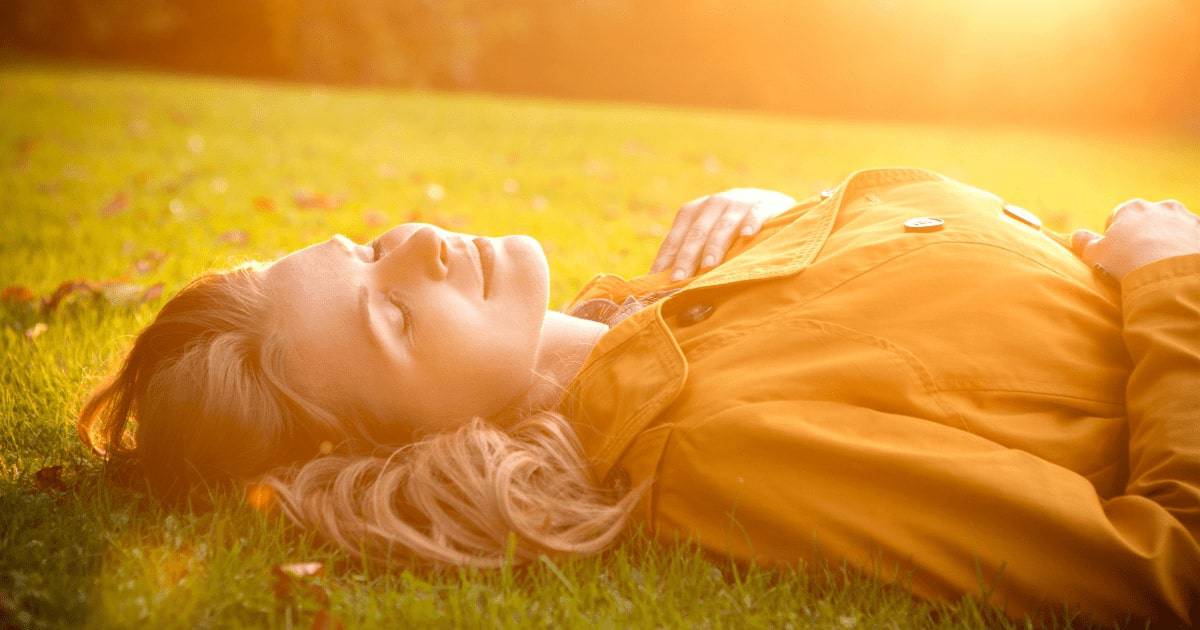
According to a recent study, people who are exposed to sunlight or bright daylight during the morning hours sleep better at night and tend to feel less depressed and stressed than those who do not have much morning light.
30) If possible, take the time for a morning walk
If possible, take in daily light with a walk. A morning walk can help set your natural circadian rhythm, which improves your sleep cycle and supports healthy sleep. The result of a good night's sleep will allow you to feel more alert and energized throughout the day. Whether you walk in the morning with your dog or to work, you will see that it will have a positive impact not only on your sleep but also on how you feel all day.
How to Get Healthy Sleep
We spend a third of our lives sleeping and it is the best thing we can do for ourselves. Lack of sleep leads to weight gain in both adults and children. Large studies have confirmed that insufficient sleep in childhood leads to a 89% probability of obesity in adulthood.
How Many Hours Should You Sleep?
- Infants (4-12 months) 12-16 hours
- Toddlers (1-2 years) 11-14 hours
- Children (3-5 years) 10-13 hours
- Children (6-12 years) 9-12 hours
- Teens (13-18 years) 8-10 hours
- Adults (19-65) -7-9 hours
- Seniors (65+) - 7-8 hours
According to long-term studies, we know that there is not a single organ in the body and no single process in the brain that does not have a positive effect on sleep. If you sleep badly, the likelihood of depression, anxiety, diabetes, cancer, heart attack or stroke increases in you. How to get healthy sleep? Sleep a sufficient number of hours.
Frequently Asked Questions
Why can't I sleep during the full moon?
Not all scientists agree on this explanation, but the impact of the moon on sleep is allegedly inherited from ancient times when people were more alert at the full moon because they were more vulnerable to animals. Or it might have been different. During the full moon - similarly to some animals - it was a suitable time for procreation.
Why can't I sleep after drinking alcohol?
Alcohol consumption - especially in excessive amounts - is associated with poor sleep quality and duration. Drinking alcohol disrupts our biological clocks, reduces melatonin production (also known as the sleep hormone), increases adenosine levels (which causes us to feel sleepy when we are awake for a long time), and forces our liver to work harder.
Overall, our body is stressed. Alcohol also disrupts the REM phase of sleep, which is essential for our regeneration and is important for a proper rest. This also affects our memory and learning process. Studies also show that alcohol use can worsen the symptoms of sleep apnea.
Why can't I sleep in the morning?
The main cause of chronic morning sleep problems is insomnia, which is defined as a sleep disorder in which an individual cannot fall asleep or wakes up frequently during sleep. Try to regularly exercise, avoid caffeine, and adjust your bedroom according to the principles mentioned in the article.
What scents improve sleep?
The most popular sleep scent is lavender, the effects of which have been confirmed by many studies. Less known is bergamot, which has a calming and soothing effect. The same goes for lemon balm, which we know more from teas, but can also be used in an aroma lamp. Other scents that help with falling asleep include the flowers of neroli (bitter orange tree), sandalwood, eucalyptus, and marjoram.
How to sleep during pregnancy?
Everyone tells you that during pregnancy you need to sleep as much as possible because once the baby is born, you will not have time for it? But how, when you can't sleep? Try to practice basic sleep hygiene and learn to sleep on your side. Don't forget to adjust your bedroom as well as possible for sleep according to the principles described above, it will come in handy.
What is sleep paralysis?
Sleep paralysis is a state between wakefulness and sleep in which we are unable to move our muscles. Even though you are awake, chemicals in the brain prevent you from moving. This state is also accompanied by terrifying hallucinations and a strong feeling of anxiety.
How to treat sleep paralysis?
If sleep paralysis occurs regularly, you should visit a specialist. The prevention of sleep paralysis is regular and quality sleep that lasts 7-9 hours.
What is sleep hygiene?
Sleep hygiene is a set of good habits that aim to improve and enhance your sleep. They are part of a healthy lifestyle. Adhering to sleep hygiene is the most effective way to achieve better sleep and overall health.
How to get a calm and deep sleep?
It has been proven that magnesium or CBD drops help support deep sleep. For a calm sleep, it is also recommended to avoid fluids for at least two hours before sleep so that you do not wake up due to a full bladder. If you are allergic, you should also remove allergens from your bedroom using anti-mite bedding, as allergic reactions can disturb an allergy sufferer at night.
Why can't I sleep?
The most common question with no easy answer. The most common problem when falling asleep is stress. This can be conscious or unconscious, psychological or physical.
What helps with sleep?
If you are looking for a sleeping pill, you can try soluble melatonin in your mouth, and magnesium for supporting quality sleep. If you cannot sleep due to stress, try dietary supplements with extracts of lemon balm.
You can also try sleeping teas, but be careful as you may have to go to the bathroom all night. Therefore, it is better to consume them no later than two hours before going to sleep.
When to eat before sleep?
It is recommended to eat at least three hours before sleep to allow time for digestion. Eating late at night can cause discomfort and interfere with sleep. It is also advisable to avoid heavy and spicy meals before bedtime.
Sources:
-
Bliwise, D. L. (1993). Sleep in normal aging and dementia. Sleep, 16(1), 40-81.
-
National Sleep Foundation. (2013). Sleep in America® Poll: Sleep and Aging.
-
Ohayon, M. M. (2002). Epidemiology of insomnia: what we know and what we still need to learn. Sleep medicine reviews, 6(2), 97-111.
-
Buysse, D. J., Reynolds III, C. F., Monk, T. H., Berman, S. R., & Kupfer, D. J. (1989). The Pittsburgh sleep quality index: A new instrument for psychiatric practice and research. Psychiatry Research, 28(2), 193-213.
-
Krueger, J. M., & Obál Jr, F. (1993). Sleep function. Frontiers in bioscience: a journal and virtual library, 1, d233-d243.
-
Wong, M. L., Lau, E. Y., Wan, J. H., & Cheung, S. F. (2013). The interplay between sleep and mood in predicting academic functioning, physical health and psychological health: A longitudinal study. Journal of psychosomatic research, 74(4), 271-277.
-
Buysse, D. J., Reynolds III, C. F., Monk, T. H., Berman, S. R., & Kupfer, D. J. (1989). The Pittsburgh sleep quality index: A new instrument for psychiatric practice and research. Psychiatry Research, 28(2), 193-213.
-
Maraldi, C., Volpato, S., Penninx, B. W., Yaffe, K., Simonsick, E. M., Strotmeyer, E. S., ... & Ferrucci, L. (2015). Impact of inflammation on the relationship among sleep duration, cognitive impairment, and dementia: A multicenter cohort study. Journal of the American Geriatrics Society, 63(2), 227-234.
-
Cajochen, C., & Chellappa, S. L. (2016). The effects of sleep hygiene education on sleep hygiene behaviors in children with neurodevelopmental disabilities. Journal of clinical sleep medicine: JCSM: official publication of the American Academy of Sleep Medicine, 12(3), 447-449.
-
Afonso, P., Figueiredo-Braga, M., Tavares, J., & Paiva, T. (2018). Sleep hygiene and actigraphic evaluation of insomnia in a sample of Portuguese college students. Sleep and Breathing, 22(3), 643-650.
- Walker, M. (2017). Why we sleep: Unlocking the power of sleep and dreams. Simon & Schuster.
- LEGER, Damien, et al. Poor sleep is highly associated with house dust mite allergic rhinitis in adults and children. Allergy, Asthma & Clinical Immunology, 2017, 13: 1-9.
-
Dement, W. C., & Vaughan, C. (1999). The promise of sleep: A pioneer in sleep medicine explores the vital connection between health, happiness, and a good night’s sleep. Delacorte Press.
-
Carskadon, M. A., & Dement, W. C. (2011). Normal human sleep: An overview. In Principles and practice of sleep medicine (5th ed., pp. 16-26). Elsevier Saunders.
-
Horne, J. (2013). Why we sleep: The functions of sleep in humans and other mammals. Oxford University Press.
-
Siegel, J. M. (2004). The essential neuroscience of sleep. MIT Press.



